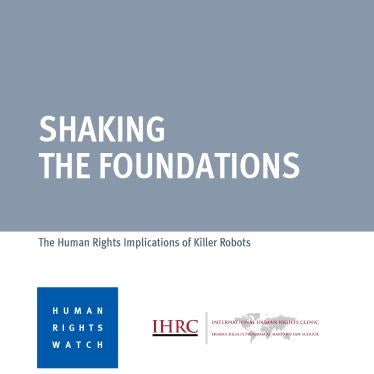Human Rights Watch warned that the Pentagon is developing laser weapons that could undermine a new international ban on blinding lasers, which takes effect tomorrow.
We are witnessing an explosion of so-called dazzling laser weapon programs that could prove to be, in effect, blinding laser weapons in disguise," said Stephen Goose, program director of the Arms Division of Human Rights Watch. "There is a real danger that the procurement and spread of such weapons could render the blinding laser ban meaningless," said Goose.
Dazzling or glare-producing lasers have as their primary function attacking human eyes. In the letter to Secretary Cohen, Human Rights Watch writes, "The distinction between a dazzling laser and a blinding laser remains disconcertingly unclear. We fear that weapons labeled as dazzlers could easily be used to blind intentionally, and that weapons labeled as dazzlers will proliferate greatly throughout the world."
Since 1995, when the U.S. agreed to the Blinding Laser Protocol of the Convention on Conventional Weapons, the Pentagon has cancelled several blinding laser weapon programs. President Clinton has stated that the U.S. will abide by the terms of the protocol, even though the Senate has yet to ratify it The protocol won the requisite twenty ratifications six months ago, and now enters into force on July 30.
Human Rights Watch identifies and provides details on a host of laser weapon programs of concern, including BOSS, Persuader, LX-5, Maglite, Saber 203, TLOS, Green Laser, Nighthawk and Y-Blue. In some cases, it appears that the very blinding laser weapons that were being developed prior to the 1995 policy (e.g., Saber 203, LCMS/TLOS) are being modified for deployment as dazzlers, with just a less apparent blinding attribute.
Human Rights Watch also expresses concern that lasers originally developed for dazzling and blinding missions are being offered to law enforcement agencies and potentially for commercial sale. In one notable example, a California-based company, Light Solutions, is reportedly developing a dazzling counter-terrorism "green laser" for the Army on behalf of the U.S. Secret Service. A secret "black" program, this laser is intended to defend the White House and other government buildings in Washington from someone who might employ a light plane or helicopter in an attack.
Human Rights Watch writes, "The emergence of operational lasers intended to attack eyes ultimately has the effect of undermining the humanitarian and nonproliferation objectives of Protocol IV [Blinding Lasers]. U.S. military personnel are thus more likely to face blinding lasers on the battlefield. The emergence of anti-personnel lasers in the civilian world also opens the way for criminal elements to obtain anti-personnel lasers. For the U.S. to research and deploy these systems undermines the `norm' against blinding that Protocol IV represents."
A July 1996 U.S. intelligence report, Worldwide Laser Capabilities, obtained by Human Rights Watch under the Freedom of Information Act, concludes, "Global proliferation of laser weapons is a real possibility." It states that "Russia leads the world in the development of laser blinding weapons," and reveals that Jordan has imported a laser dazzler.
The Human Rights Watch letter asks Secretary Cohen to:
- provide additional details about the laser weapon systems identified in its letter, particularly about their capacity to be used to blind permanently
- clarify the distinction between blinding lasers and dazzling lasers
- articulate U.S. policy regarding development and use of lasers to attack human eyes
- explain the seeming contradiction between development of dazzling lasers and the DOD policy against lasers that even temporarily blind
- provide an explanation of how the U.S. will ensure that dazzling lasers, as potentially blinding weapons, will not be used to blind
- provide assurances that the U.S. is not seeking to undermine the letter or spirit of Protocol IV.
The letter was accompanied by several fact sheets about lasers in the U.S. inventory, as well as copies of earlier correspondence between Human Rights Watch, Senator Patrick Leahy, and then-Secretary of Defense William Perry. Copies of the letter and other materials are available upon request








